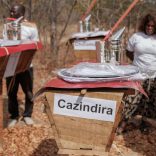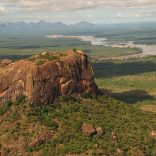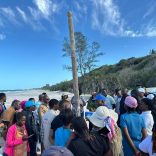Mozambique: 400 animals introduced into Banhine National Park
Climate: Portugal, São Tomé, Cape Verde and Mozambique team up at COP21

In file Club of Mozambique.
Portugal, São Tomé, Cape Verde and Mozambique yesterday presented three ongoing climate change mitigation and adaptation projects to the Paris COP21 climate summit.
The three projects, developed with the support of the Portuguese Cooperation and funded by the Portuguese Carbon Fund, were presented at a conference entitled “Plan C – Climate Proof: Progress in Cape Verde, Mozambique and Sao Tome and Principe”, and are the EBAC (Low Carbon Strategies), IAC (Integration of Adaptation in Cooperation) and PACA (Community Action Plans of Adaptation) programmes.
Nuno Lacasta, President of the Portuguese Environment Agency (APA), said that Portugal has assigned a total amount of EUR 17.5 million to climate change mitigation or adaptation projects in Portuguese-speaking African countries.
“For Portugal, the investment in these initiatives is of the greatest relevance for the positive and practical implications in the partner countries, and because we believe it is an excellent vehicle to strengthen our capabilities in the field of climate change,” said Lacasta.
Speaking to Lusa news agency at the end of the conference, the president of the APA explained that “Portugal learns from these projects in terms of their participatory approach with local communities who get to chose which climate change measures they want to see implemented in their communities”.
This applies fully to the PACA project, presented by Rosália Pedro, a technical member of the national direction for the environment in Mozambique, a program that “brings with it the advantage of helping communities to become more resilient to climate change”.
“What we expect of the project – which is being implemented in nine villages initially – is for it to be expanded to other locations in the country,” Pedro told Lusa, adding that “communities identify their adaptation needs according to what they have suffered.”
“For example, if it is drought, building a dam is a priority. We build the dam and hand it over to community management. The dam can be used for water for animals to drink and to irrigate small gardens,” she said.
Carlos Moniz, director of studies, analysis and clarification of the National Institute of Meteorology and Geophysics of Cape Verde, presented the EBAC 36-month program, budgeted at one million euros, and which is to be completed in September 2016.
“There are two projects for us at this point which are extremely important, especially with regard to training and education in Portuguese,” Moniz explained, adding that it is “a plus for Cape Verde to have its own trained personnel and draw up its own climate change adaptation and mitigation projects.”
Adérito Santana, a meteorologist at the National Institute of Meteorology of Sao Tome and Principe, recounted how her country is developing an EBAC low carbon development strategy and reported on the implementation of the IAC project in the archipelago, a programme budgeted at about 570,000 euros and expected to end in March 2016.
“The IAC was of great importance to us because it meant that, nationally, we could teach people from both public and private institutions to assess climate change issue when drawing up their projects,” Santana said.












Leave a Reply
Be the First to Comment!
You must be logged in to post a comment.
You must be logged in to post a comment.